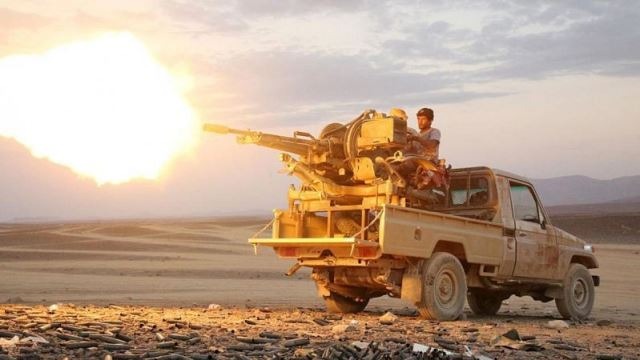


Barran Press
A recent study has identified 5 key factors that could lead to a decisive military operation against the internationally designated terrorist group, the Houthis, with the city of Hodeidah and the western coast as its potential epicenter.
The study, conducted by the Al-Mokha Studies Center and titled "Prospects of Escalation Against the Houthis Amid American Desire and Saudi Conditioning," was obtained by Brin Press.
The first factor is the availability of international support. The Red Sea attacks have shifted the positions of the United States and the United Kingdom, and to a lesser extent, European countries, towards liberating the city of Hodeidah. After exerting significant pressure to halt the advance of the legitimate government forces towards the heart of Hodeidah in 2018, these countries are now pushing for this battle.
The second factor is the waning Iranian influence. The Israeli attacks on Lebanon and the fall of the Assad regime in Syria have resulted in a significant decline in Iranian influence in the region. It is evident that there is both an international and regional desire to further undermine this influence, with Iraq and Yemen, if not Iran itself, now in the spotlight.
The third factor is the Yemenis' aspiration for a scenario similar to what happened in Syria. The strikes against the Lebanese Hezbollah and the rapid events in Syria have fueled Yemenis' hopes for comparable developments that could lead to the end of the Houthi coup with minimal costs.
The fourth factor is the ongoing activity within the legitimate authority, which suggests the possibility of a significant development, particularly in Hodeidah and the western coast. The final factor is the Houthis' apprehension and growing concerns, as they openly express their fears and continue their military mobilization towards Hodeidah.
Opportunity Knocks
The study states that the tensions between regional and international powers, as well as the divergence of their priorities, are among the main reasons for the prolonged war in Yemen and the oscillation between peace and war. As a result, Yemen has paid a heavy price due to these contradictions.
The study urges these powers not to miss the current opportunity, taking into account the interests of the Yemeni people, especially after the war has lasted longer than it should have, leading to the collapse of Yemen's economic and humanitarian conditions.
According to the study, seizing this historic moment requires Saudi Arabia to decouple the Yemeni file from its wider regional confrontation with Iran. The study also calls on the international community to exert pressure and support a transformation in Yemen similar to the case in Syria, and to invest heavily and in the long term in Yemen's security and stability by strengthening its legitimate political authority and mobilizing funds for reconstruction and economic development to create lasting peace that safeguards the interests of Yemen, the region, and the world.
Echoes of the Syrian Developments
The study notes that the rapid developments in Syria, which culminated in the fall of the Assad regime and the liberation of Syria from Iranian presence, have sparked hope in Yemeni circles for a shift in the international positions towards the Houthis.
The Information, Culture, and Tourism Minister, Moammar Al-Eryani, has affirmed that the region is entering a new phase of hope and freedom, urging Yemenis to seize the opportunity and not miss the chance to restore their capital, land, and future.
Similarly, the member of the Presidential Leadership Council, Tariq Saleh, has called for doubling efforts and maintaining full readiness and preparedness for the day when Sanaa will witness what Damascus has experienced in its return to the Arab fold.
He revealed that the international community's approach has changed from when it halted the battle to liberate the city of Hodeidah, as the world has now witnessed the full truth that Iran's tools pose a threat not only to Yemen and Yemenis but to the region and international navigation as well.
Saleh emphasized the need to prepare for the day of national salvation, which requires all loyal national forces to overcome their differences and unite in the battle.